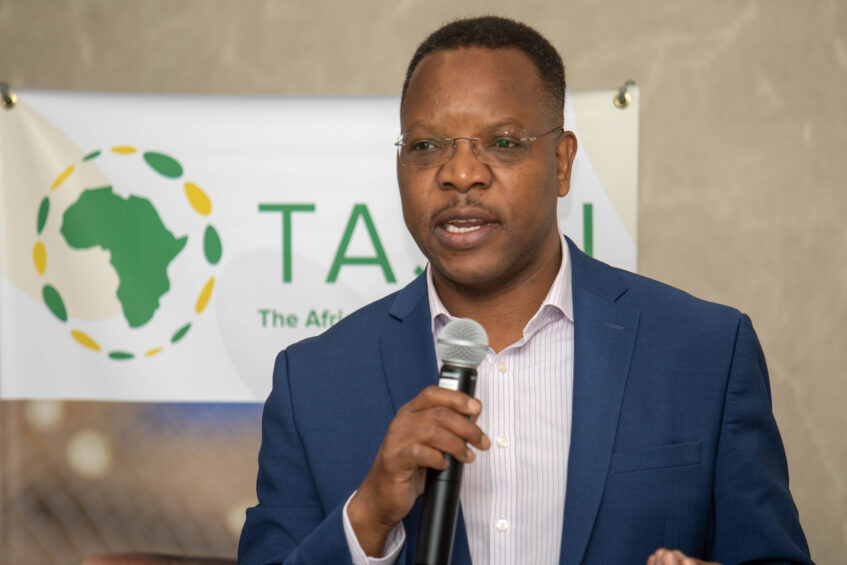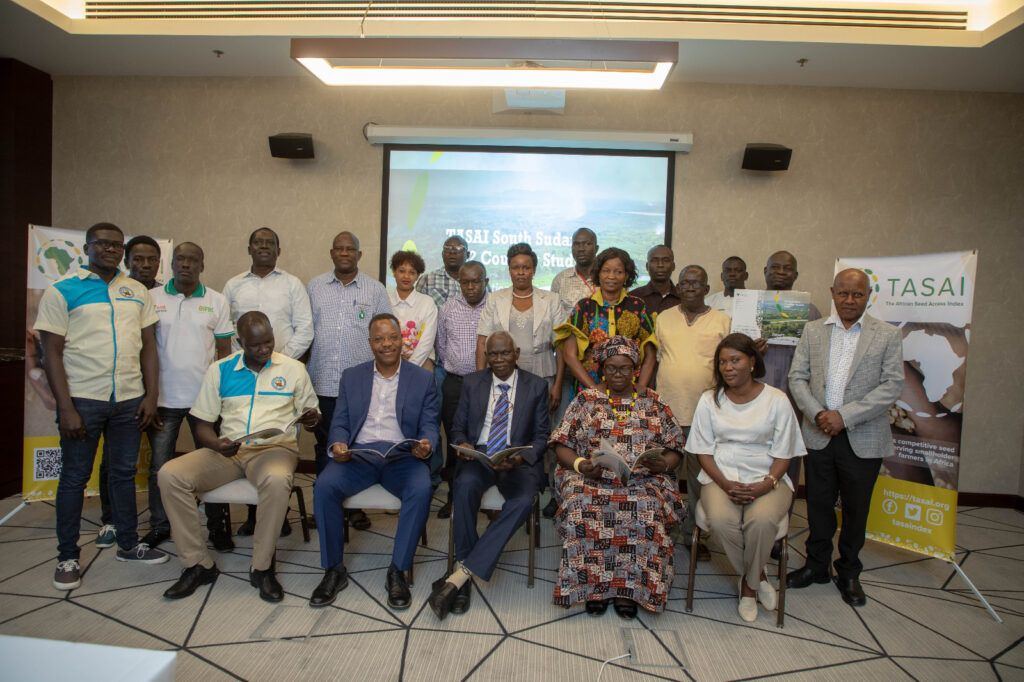
Edward Mabaya, Chief Scientific Advisor for the African Seed Access Index – TASAI speaking during the TASAI South Sudan 2022 country study dissemination meeting in Juba on 27th April 2023.
A continental seed research industry has commended South Sudan for the nascent step toward the development and improving the country’s seed sector.
In 2022, the African Seed Access Index – TASAI conducted the first TASAI South Sudan 2022 country study to highlight the formal seed development in the country.
“Given the amount of time that South Sudan is yet to set up a seed system here, I will consider them as doing reasonably well that is just the good news,” Edward Mabaya, the Chief Scientific Advisor for the African Seed Access Index told Eye Radio.
The report due for publication focused on South Sudan’s four important cereal and legume food security crops, such as Maize, sorghum, cowpea, and groundnut.
The study sheds light on the development and areas for improvement in the country’s formal seed sector which TASAI believe is at the promising stage of growth.
Edward Mabaya said despite an effort by South Sudan authorities to improve the seed sector, the absence of a seed policy remains the major obstacle to developing the industry.
“The bad news is still there is quite a lot of gaps that need to be filled in for example this country does not have the seed policy.”
“When you don’t have a seed policy, it is hard to make improvements on all the other sectors that are required to be able to regulate all this seed sector,” he said.

During the study, TASAI said seed production and marketing were not adequately regulated in South Sudan which makes assessing the competitiveness of formal seed challenging.
It adds that the nonexistence of South Sudan’s seed policy regulatory framework also weakens the sector.
Another challenge identified during the 2022 study is the inadequate government agricultural extension services and low registered and active agro-dealers which hinder the effectiveness of seed distribution systems.
“As you know, the seed sector requires many government instruments and regulations to make sure what farmers are getting is proper without a good seed policy, it is hard to get some of those things in place.”
“The country is doing well relative to how young the industry is but still there is huge potential for improvement in years to come,” Mabaya stressed.
Since 2015, the African Seed Access Index tracks indicators across five broad categories in each African country.
This includes Research and Development, Industry Competitiveness, Policy and Regulations, Institutional Support, and Service to smallholder farmers.
The outcome contributes to the improvement and access to locally adapted, affordable, and high-quality seeds of appropriate varieties by smallholder farmers in Sub-Saharan Africa.
Edward Mabaya however recommended the need to develop other sectors such as mechanization farming and empowerment of local farmers.
“My broad recommendation to South Sudan is that it is agriculture that will unlock livelihoods for millions of people in this country.”
“So, my recommendation is to double down on the investment in the agriculture sector.”
“Seed is just one of the sectors there are other areas that are required for example fertilizer input, other agro-inputs, mechanization, irrigation, they are all areas that complement very well investment within the seed sector.”
“We are looking at the seed sector here it is one of the key areas that requires investment but there are other areas too that the government could explore.”
Over the past years, TASAI encourage African governments and development agencies to create and maintain enabling environments that accelerate the development of local private sector-led seed systems serving smallholder farmers.
It also works to measure and monitor over time, variables that are critical to build an enabling environment for a vibrant seed sector in Africa.
Towards competitive seed systems serving smallholder farmers in Africa, TASAI promotes inclusiveness for all toward food security.
On 27th April 2023, TASAI in collaboration with the Seed Trade Association of South Sudan disseminated the findings of the country’s study to key seed industry stakeholders from the line Ministries, private sector, research sector, and development partners.
Dr. Margret Itto, the Executive Director of Afroganic Seed, a local seed company in Torit, Eastern Equatoria State believes the study will enable the seed grower to address the gaps in developing the seed sector.
“This survey is very important because you know without a survey, you will stay thinking everything is good, 100% but today with this survey we realized that there are things that we need to do because they rate poor, they rate fair.”
“We need to improve on it as seed growers as a government and also our partners, the NGOs. To me it will bring improvement in the quality of the seed sector,” she added.
According to the Ministry of Agriculture, South Sudan has arable land considered suitable and fertile for agriculture as well as plenty of rivers and basins.
The Food and Agriculture Organization of the United Nations also reported that only 5% of South Sudan’s arable land is cultivated due to insecurity and inadequate investment in the agriculture sector.
George Louise Tadu, the Director General of Research at the National Ministry of Agriculture commended TASAI for conducting the first seed study in South Sudan.
He however appealed to TASAI to reconsider conducting such studies at subnational levels.
“This study, the way I have seen it covered only a small part of the country and we need TASAI in the next stage to go to other areas.”
“For example, go to the Upper Nile, go to Bahr el Ghazal, and even beyond the circle of the national Ministry of Agriculture. Instead, it should focus more on the state Ministries rather than the national government,” Louise told Eye Radio.
There are currently 14 active registered seed companies in the country with the top four entirely selling sorghum and Cowpeas seeds.
During the TASAI South Sudan 2022 Country study, eleven seed companies were surveyed and most of them had a low rate of competitiveness.
Isaac Woja, Secretary for the Seed Trade Association of South Sudan said though South Sudan is yet to develop its seed sector, the country is doing better.
“We are not far from the other countries yes we are lagging behind but there are a few things that we need to look at so that we can be able to improve and make the industry better.”
“First we have realized that lack of system is one thing crippling the industry and when we talk about lack of systems we mean there is no policy, there is no law, there is no regulatory framework and that is why fake seed or underrated seeds are being traded in the market and farmers are the victims at the end of the day.”
For his part, Luka Atuok, the Research Scientist at the National Ministry of Agriculture said the dissemination of the findings has enabled the government to identify gaps in the seed sector.
According to him, the government is working to finalize the seed policy as well as empowering local seed companies to effectively produce quality seed in the country.
“There are so many different gaps that need to be taken care of especially the seed policy needs to be completed so that the seed system can be regulated and also the area of the seed business,” he said.
Luka Atuok went on to say “When you look at the seed companies in the country, we need to see how our seed companies can be funded because at the moment there is no funding for our seed companies to start their business.”
“Same as for the government, when you look at the seed research, there is no funding for research, lack of infrastructure whereby all these need to be taken care of in terms of working with donors and even our partners so that those areas can be funded.”
Luka Atuok went on to say that some key areas have been captured during the 2022 study but cited the need to create more awareness of the status of seeds in South Sudan.
“Everything was okay especially the content of the dissemination because it follows exactly what was done to generate the report so all the major areas were captured especially things related to seed development in South Sudan.”
“The most important thing that is not covered and that TASAI can bring awareness because most of the areas in the seed system are almost covered but there is not much awareness on what is the status of seeds in South Sudan.”
Support Eye Radio, the first independent radio broadcaster of news, information & entertainment in South Sudan.
Make a monthly or a one off contribution.
Copyright 2024. All rights reserved. Eye Radio is a product of Eye Media Limited.